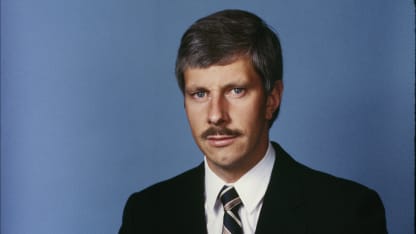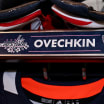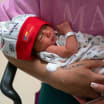Caps History: The Hiring of David Poile
On Aug. 30, 1982, Pollin Pollin announced that he had hired 33-year-old David Poile as general manager.

On July 20 Capitals owner Abe Pollin conducted a press conference at which he outlined the franchise's bleak financial picture, claiming losses of $21 million during the first eight seasons of the franchise's existence. He then announced a set of four conditions that would have to be met to ensure the continued operation of the Capitals in the Washington area.
Those conditions included the sale of 7,500 season tickets, complete sellouts of the first 10 home games, a reduction in the Caps' rent to the Capital Centre from 15 to 10 % and a reduction of the Prince George's County entertainment tax.
If those conditions were met within 30 days, Pollin would be able to attract a new group of investors, including current Caps president Dick Patrick. If not, three outcomes were possible, none of them palatable for area hockey fans. The club could have been sold and moved, merged with another team and moved, or simply disbanded.
With the team just weeks away from the start of training camp, the uncertainty surrounding the franchise's status finally reached closure in what was arguably the most eventful seven-day period in franchise history.
On Aug. 24 the Prince George's County Council met and listened to Pollin make his case for his hockey team.
"At this time Prince George's County is effectively without a hockey franchise," he declared. "My new investors and I are trying to, in effect, bring a new hockey team to Prince George's County … With passage today of CB-143-1982, my investors and I will consider all four conditions as having been met. A favorable vote today will result in the Washington Capitals taking the ice against the Philadelphia Flyers on October 9 at our regularly scheduled home game."
Soon afterwards the council voted 10-1 to reduce the entertainment tax from 10 % to one-half of 1 % for a period of three years. Pollin announced that the Caps would remain in the District even though only three of the conditions had actually been met at the time.
The goal of selling out the first 10 games was reached a week earlier when a group of area businesses stepped forward to guarantee that all 18,130 seats would be purchased for each of the first 10 Capitals games of 1982-83. A rent reduction of 33 % had been granted. The season ticket goal fell about 2,000 shy of the stated goal, but two other corporations came forth to guarantee two more sellouts, which Pollin equated to being the same as 600 new season tickets. He and his group of investors then decided that 6,200 new season tickets was close enough to continue operation of the franchise in the area.
With the Capitals assured of being in Washington for the immediate future, Pollin and Patrick, the newly named executive vice president, set about the business of improving the team on the ice. Their first move in that direction was another off-ice move that turned out to be a very good one.
On Aug. 27, 1982, Pollin announced that he had relieved acting general manager Roger Crozier of his duties, "effective immediately." Three days later Pollin announced that he had hired 33-year-old David Poile as Crozier's replacement.
In the aftermath of this personnel move, Crozier admitted that he was "surprised and a little disappointed. Frankly, I am quite proud of the job I've done. They are finally going to have a team here that can win."
Crozier had been on the job for only 10 months, but his words proved to be prophetic. They were also bold words for a team that had yet to make the playoffs in any of its eight seasons in the NHL while just averaging 53 points and 20 wins per campaign.
An obviously pained Crozier went on to discuss the situation and the team at length.
"[The dismissal] was the furthest thing from my mind, because of all we have been through this summer. I have been demanding from my people loyalty to the organization, and telling them that it would pay off in the long run.
"All I hope is that Abe Pollin realizes what I did for him. [Head coach] Bryan [Murray] and I came in here and hung in there with him through his troubles and unfortunately, at the end, I am the guy that goes out the door."
Crozier correctly surmised that Pollin already had his replacement lined up.
"I can only wish him good luck," Crozier went on. "because that is my team. I believe that we have done enough good things that the team is going to win. We made all the moves we could.
"The new guy has a solid foundation to build on. This is going to be a really exciting and competitive hockey club. It would be a real shame if a new guy comes in and tries to unravel this thing, because we are in pretty good shape right now."
Crozier admitted that he and Pollin sometimes did not see eye-to-eye, citing a deal he had engineered the previous November that would have sent goaltender Mike Palmateer to another club in exchange for a badly needed defenseman. Several weeks later Pollin had a change of heart and told Crozier to go ahead with the deal. By that time, the other club was no longer interested.
"He [Pollin] was the boss and wouldn't agree with everything you tried to do," said Crozier. "I would never consider making a deal with a 'name' player without thrashing it out with him first."
Crozier had taken over in November, 1981 when Max McNab was fired after nearly six years on the job. Crozier had been McNab's assistant and he was promoted to fill the job when McNab was let go. Crozier remains the only man in franchise history to have served as a player, coach and general manager of the Capitals. His lone appearance at the Entry Draft table resulted in the team selecting future Hall of Fame defenseman Scott Stevens with its first round choice (fifth overall choice in 1982).
As for Poile, he became the youngest general manager in the NHL at the tender age of 33. The son of longtime NHL executive Bud Poile, David Poile had the hockey pedigree, but he had also served a long apprenticeship as an assistant general manager under highly regarded Cliff Fletcher in Atlanta and Calgary.
"I would never have accepted this job if I did not believe the Capitals would make the playoffs in 1982-83," said Poile to the assembled media at the press conference called to announce his hiring.
Patrick announced the team's hiring of Poile, saying that newly hired GM "will be responsible for all hockey matters, and will meet with [team owner] Abe Pollin and myself daily to discuss plans for improving the Capitals."
But Poile also made it known the he expected to be in charge with little interference from elsewhere within the organization.
"The general manager has to be able to do things on instinct," Poile stated. "Last year at the draft, we [Calgary] made a deal at 3 a.m. If we'd had to contact the owners first, we probably wouldn't have been able to complete it. My definition of the GM is the overseeing of the organization.
"I brought that up with Abe, and he told me that if I can make deals to better the team, he's not adverse to doing anything. As far as I'm concerned the hockey department is my baby, and I should be able to go ahead."
From the very beginning Poile made it clear that he had no intention of installing his own man as the team's head coach and that Bryan Murray would remain Washington's bench boss.
"It was an absolute stipulation that there not be a coaching change," he said after taking over the team's personnel reins. Poile and Murray went on to work in tandem together for more than seven years, longer than any other Caps general manager/coach combination before or since.
Washington avoided losing its hockey team, but the Caps were still looking for their first playoff berth and no one was talking of the District as a hotbed of hockey. Poile was asked what he thought it would take to turn Washington into a hockey town.
"Got to get the people to three games," he offered, "and sitting near fairly knowledgeable fans. If the team doesn't stink the joint out, we'll gain quite a few fans. The first 10 games [the guaranteed sellouts that were part of Pollin's conditions] are critical. They could turn off a lot of people.
"But you don't want to get the players too uptight, for where you are April 3 is really what's important," he added, not losing sight of what really mattered.
Poile was thankful for his opportunity in Calgary, but he was also eager to immerse himself in the new task ahead of him and to distance himself from his past.
"Called the [Flames] owner to thank him, and told him I was in the shower scrubbing the logo off my butt," he added in a humorous aside.
Before the tape recorders were shut off and the notebooks put away, Poile uttered some prophetic comments about a big deal that loomed ahead just around the corner.
Poile said he would spend his first week on the job talking to his peers around the league to "get a feeling of what they think of the Caps and at the appropriate time in October or November, when some team is not doing so well, we'll be ready to make changes. We could make a fairly substantive deal in October or November."
He further commented that "several [Caps] players are considered stars in Canadian cities," and that building a stronger defense in Washington was his top priority.
Using a couple of those players who were considered stars in Canadian cities, Poile set about building that stronger defense. And he didn't wait until October or November, either.


















